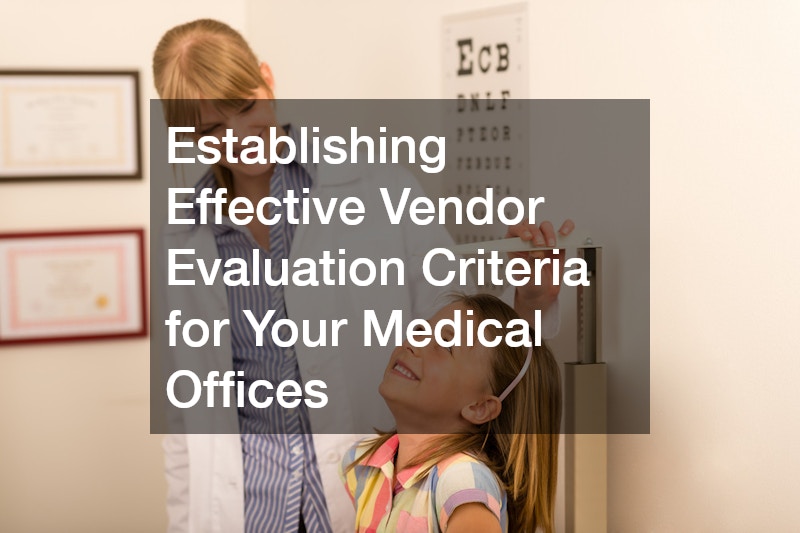Running a medical office means juggling many moving parts, and vendors play a central role in keeping operations smooth, efficient, and professional. Whether it’s support services, technology, or clinical partnerships, having reliable external providers is essential for ensuring patient satisfaction and meeting operational goals. But with so many vendor options available, it can be difficult to know which partners are the best fit. That’s where vendor evaluation criteria come into play, giving medical offices a structured approach to making well-informed decisions.
Effective vendor evaluation starts with clarifying internal needs. Understanding what your office requires helps prevent misalignment when it comes time to compare services. After identifying core needs, it’s equally important to set clear budget expectations and determine how flexible or scalable a vendor’s offerings are. Not all services are created equal, and not every provider can meet the standards required by a healthcare setting. That’s why experience, reputation, legal fit, and daily support capacity must all be considered through a comprehensive, consistent process.
This blog breaks down ten vital areas of focus for evaluating potential vendors in a medical office setting. From financial constraints and legal considerations to sanitation standards and clinical specialty services, each section explores the practical elements of selecting partners who can reliably support your operations. The blog also highlights the importance of modern tools and waste management in the healthcare field, which are often overlooked in traditional vendor comparisons. No matter your practice size or specialty, developing a reliable framework for comparing and selecting external providers ensures smoother operations and fewer headaches in the long run. Read on to learn how each of these considerations fits into a broader approach to establishing effective vendor evaluation criteria tailored for your medical office.
Clarify Office Needs

Before reaching out to any vendor, it’s critical to step back and define what your medical office needs. Without a clear understanding of your operational gaps, it’s easy to waste time evaluating services that don’t align with your goals. Vendor evaluation criteria should begin with identifying recurring pain points—whether it’s workflow efficiency, compliance, or patient experience—and translating those into service requirements.
Business consultants can play an important role in this early phase. They help medical offices assess their internal systems and map out strategic needs, which streamlines the selection process for external support. Whether your practice is preparing for growth or responding to new regulations, these professionals can pinpoint where vendor partnerships can add the most value.
By working with a consultant before beginning the vetting process, your office can create a targeted list of must-have services. This makes the vendor evaluation criteria more relevant and specific, resulting in a shorter list of qualified vendors who already align with your mission and requirements. The added clarity helps eliminate guesswork and leads to more confident decision-making.
Set Budget Limits
Budget constraints are a reality for nearly all medical offices, especially those balancing high overhead with tight reimbursement schedules. A successful vendor evaluation criteria framework must account for financial limitations right from the start. Without clear budget limits, you may entertain options that appear ideal but are ultimately unsustainable.
Take office pantry services as an example. While they may seem like a minor line item, these services can impact staff morale and daily operations. Determining how much to invest in amenities like snacks and beverages—without overspending—requires careful budgeting and comparison of vendor pricing models, especially when working within broader cost-saving initiatives.
Including financial benchmarks in your vendor evaluation criteria helps prevent wasted time on proposals that are out of scope. It also ensures your office can maintain vendor relationships over the long term. Vendors that provide transparent pricing, clear contract terms, and scalable options will align better with your fiscal priorities and operational stability.
Check Experience

Experience is a foundational component of any reliable vendor relationship, particularly in a medical setting where downtime or miscommunication can quickly escalate into costly disruptions. When applying vendor evaluation criteria, looking closely at the provider’s background, industry familiarity, and prior client results can significantly reduce risk.
This is especially true when evaluating an IT help desk provider. Your medical office depends on a seamless digital infrastructure—from electronic health records to appointment scheduling systems. Partnering with an IT team that has experience supporting healthcare offices ensures quicker resolutions, better data compliance, and more effective problem prevention.
Make sure your vendor evaluation criteria include proof of industry-specific experience, case studies, and testimonials. A seasoned IT help desk provider will already understand the security requirements and urgency unique to healthcare, making them a much stronger fit than a generalist firm.
Review Legal Fit
Vendor relationships often include complex contracts, compliance concerns, and liability issues. Ensuring that legal alignment exists is critical, which is why any vendor evaluation criteria should include input from or review by a legal professional to protect your office from unexpected risks.
A business law attorney can help evaluate service agreements, flag contract loopholes, and confirm that vendors understand and follow industry-specific regulations. Whether it’s HIPAA compliance, employment practices, or vendor indemnification clauses, their role ensures that your office won’t face legal complications due to poorly structured arrangements.
Incorporating legal review into your vendor evaluation criteria gives your practice an added layer of security and professionalism. It ensures every contract you sign protects your interests and clearly defines performance expectations and penalties for non-compliance, key in today’s risk-sensitive environment.
Vet Daily Support

Reliable daily support is vital to maintaining health and safety in any medical environment. That’s why vendor evaluation criteria must go beyond checking basic capabilities and include an assessment of consistency, responsiveness, and adaptability.
Medical building cleaning services are a prime example of where this matters most. The appearance and hygiene of your office directly influence both patient perception and infection control. Providers must meet not only routine cleaning standards but also be prepared to adapt during health crises or unexpected events that demand rapid sanitization.
Make sure your vendor evaluation criteria include reviews of staffing policies, response time guarantees, and quality control systems. A provider that excels in these areas will ensure your environment remains safe, clean, and welcoming to patients and staff alike, without requiring constant oversight.
Assess Cleanliness
Cleanliness in healthcare environments is non-negotiable. While most medical offices prioritize cleanliness in common areas, the evaluation of hygiene standards should extend to all external partners who work within or contribute to your facility. Vendor evaluation criteria should include clear expectations for sanitation, sterility, and infection control practices.
Dentists often have rigorous standards when it comes to cleanliness due to the nature of oral procedures and patient proximity. When collaborating with or referring to dental providers within a shared building, it’s essential to ensure they follow the same rigorous cleaning protocols. This helps maintain a unified standard across all services offered under your office umbrella.
Incorporating cleanliness benchmarks into your vendor evaluation criteria reduces the risk of health code violations and cross-contamination. Ensure that any medical partner or associated provider—like a dentist—is held to the same hygiene standards your practice upholds. This consistency reinforces patient trust and supports a cohesive standard of care across the board.
Specialty Readiness

Specialty service providers require a different layer of scrutiny, particularly in healthcare. Your vendor evaluation criteria should account for whether a partner is not just competent but also tailored to serve a specific patient demographic or medical niche. Specialty readiness ensures they can meet your patients’ unique needs without compromising on care quality or efficiency.
A pediatric center, for instance, must demonstrate its ability to provide age-appropriate care, emotional support for children, and communication strategies that work with both young patients and their guardians. Not all vendors are equipped for these nuances, and choosing one that lacks pediatric experience could negatively impact outcomes or patient satisfaction.
Evaluating vendors through the lens of specialty readiness means reviewing past case histories, staff certifications, and patient satisfaction data. When incorporated into your vendor evaluation criteria, this step ensures you’re aligning with providers who elevate—not undermine—your office’s service quality and reputation.
Evaluate Technology
Technology is rapidly transforming healthcare delivery, and vendors must be evaluated not only for their equipment or platforms but also for their adaptability and integration capabilities. Vendor evaluation criteria should include a thorough analysis of a partner’s technological sophistication, reliability, and compatibility with your existing systems.
For example, an upright open MRI provider must offer not only innovative imaging solutions but also seamless data transfer to your office’s patient record system. This includes compliance with privacy laws, image clarity, and ease of scheduling. The technology should enhance, not complicate, your practice workflow or patient care process.
Make sure your vendor evaluation criteria include hands-on demonstrations, technical support assessments, and data security policies. Choosing technologically advanced vendors—like those offering upright open MRI—ensures your practice remains competitive, efficient, and attractive to both new patients and referring physicians.
Measure Flexibility
In the healthcare world, adaptability is more than a convenience—it’s a necessity. Your vendor evaluation criteria should include the ability to respond to changing needs, whether due to patient volume shifts, regulatory updates, or evolving care standards. A flexible vendor helps your medical office navigate unforeseen challenges with minimal disruption.
This is particularly important when working with a hormone replacement center, where treatment plans are often personalized and long-term. You’ll want a partner that can adjust dosing protocols, accommodate patient needs, and collaborate with your in-house providers without rigid structures getting in the way.
When evaluating flexibility, look for evidence of customized service plans, collaborative communication practices, and willingness to scale services up or down. Incorporating flexibility into your vendor evaluation criteria ensures long-term compatibility and patient-centered care, especially when your partnerships involve dynamic, ongoing treatment programs.
Plan for Disposal
Waste management may not be the first thing that comes to mind when considering healthcare vendors, but it’s an essential part of operational efficiency and regulatory compliance. Your vendor evaluation criteria should account for how a provider handles disposal, especially when it involves medical waste or frequent office cleanouts.
A local dumpster rental company must offer more than just containers—it must understand the specific disposal requirements for medical facilities, including safe handling of sharps, expired products, or bulk trash from renovations and reconfigurations. Timeliness and regulatory adherence are crucial.
Include documentation standards, pickup schedules, and local compliance knowledge in your vendor evaluation criteria when considering a disposal vendor. Choosing a reliable provider in this category helps your medical office maintain cleanliness, avoid fines, and ensure patient and staff safety, even in behind-the-scenes operations.
Assessments Going Forward
Establishing effective vendor evaluation criteria is one of the most important steps your medical office can take to ensure operational stability, regulatory compliance, and consistent patient care. Every external partner—from administrative support to clinical service providers—has the potential to influence the quality and safety of your daily operations. This is why it’s so important to have a structured and thoughtful approach to evaluating vendors before entering into long-term agreements.
Throughout this article, we explored ten key areas that should shape your vendor evaluation criteria. These include understanding your office’s specific needs, staying within budget, confirming legal and regulatory alignment, ensuring hygiene and cleanliness standards, and vetting specialty and technology capabilities. We also covered essential support services that can be easily overlooked, like IT responsiveness and responsible waste disposal. Together, these categories form the foundation of a well-rounded vendor strategy tailored to the unique demands of a healthcare environment.
An effective evaluation process does more than just prevent mistakes—it saves your staff time, conserves financial resources, and supports better patient outcomes. It also promotes consistency across departments and reduces the risk of service gaps or compliance failures. In today’s competitive and highly regulated healthcare landscape, having strong, capable vendors is not optional. It’s essential.
Your medical office deserves partners who bring value, accountability, and adaptability to the table. With clear vendor evaluation criteria in place, you can make more confident decisions, foster stronger professional relationships, and build a vendor network that supports both immediate needs and long-term growth. The more precise and consistent your evaluation process becomes, the more efficient, resilient, and patient-focused your practice will be moving forward.

